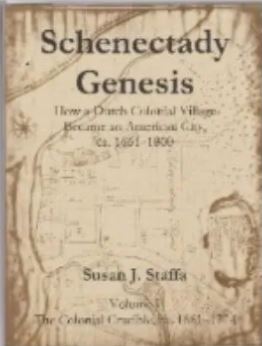
Our History
When first encountered by Europeans, the area that is now Schenectady was the land of the Mohawk nation of the Iroquois Confederacy. When Dutch settlers arrived in the Hudson Valley in the 17th century, the Mohawk called the settlement at Fort Orange (present day Albany, NY) Schau-naugh-ta-da, meaning "over the pine plains." Eventually, this word entered the lexicon of the Dutch settlers, but the meaning was reversed, and the name referred to the bend in the Mohawk River where the city lies today.
Schenectady was first settled by Europeans in 1661 when the area was part of the Dutch colony of New Netherland. Settlement was led by Arent van Curler, a prominent figure in the colony who had emigrated from Nijkerk in the Netherlands, after purchase from the Mohawk Nation. Some of the Dutch brought African slaves to the region as laborers, as did the later English. In 1664 the English seized the Dutch colony and renamed it New York. Settlers purchased additional land from the Mohawk in 1670 and 1672. Twenty years later (1684) Governor Thomas Dongan granted letters patent for Schenectady to five trustees.
On February 8, 1690, during King William's War, French forces and their Indian allies attacked Schenectady by surprise, leaving 62 dead. American history notes it as the Schenectady massacre. In 1748, during King George's War, the French and Indians attacked again. In 1765, Schenectady was incorporated as a borough, and 30 years late in 1795, Union College was founded.

Moving on to today: The Colonial Schenectady Project and a new era of revitalization
In 1989, The Colonial Schenectady Project, Ltd. was founded to stimulate Schenectady’s revitalization through tourism. Its first effort came in 1990, a self-guided tour of Schenectady’s Founded1989 Historic District and the first historic district in the State of New York. The tour, named Colonial Schenectady: An American Crucible, was the creation of the highly acclaimed Schenectady Stockade Historian, Dr. Susan J. Staffa. Its focus is on the dynamic character of Colonial Schenectady and its profound impact on the development of the American frontier. The tour’s map and CD are available for purchase at the Schenectady County Historical Society, 32 Washington Avenue, Schenectady, NY 12065. More information regarding Genesis 1 and its author can be found in the Genesis 1 tab in this website.
The Colonial Schenectady Project Mission
"To be a major educational resource promoting Schenectady’s rich and unique heritage”
Goals:
- Provide informative writings and multi-media presentations reflecting the rich history of Schenectady
- Increase tourism in historic Schenectady
- Instill community pride in Schenectady’s long rich heritage
In 2004, Colonial Schenectady Project’s first book came to fruition, titled Schenectady Genesis: How a Dutch Colonial Village Became an American City, ca. 1661 –1800. Volume I, The Colonial Crucible 1661 - 1774 . This 400 page fully indexed work traces the evolution of Schenectady into the early 1770’s. The volume contains illustrations, maps, charts and bibliography documenting a multi-cultural and diverse population that became a unified society. Information on the author and reviews of this book can be found in the Genesis 1tab of this website.
(Currently, the first edition Genesis I is not available, however, a second edition of Genesis I is expected to arrive by the fall, 2022.
. 
The next major effort came to fruition in 2021, a sequel titled, Schenectady Genesis, Volume II: The Creation of an American City from an Anglo-Dutch Colonial Town, ca. 1760- 1800. An informative sequel covering the Revolutionary War and incorporation of the city, it welcomed John F. Gearing, Esq.to be its author, edited by Chris Leonard. This 500-page sequel begins where Genesis 1 ends and continues on to 1800. Information on the author and reviews ofthis book can be found in the Genesis II tab of this website.

Contact:
Colonial Schenectady Project
28 Ridgefield Drive
Voorheesville, NY 12186
Email: This email address is being protected from spambots. You need JavaScript enabled to view it.
Website: www.ColonialSchenectady.com or http://colonialschenectady.com
